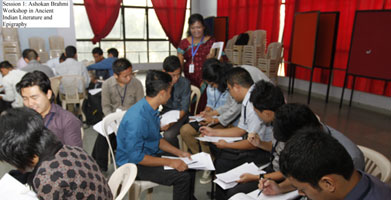
Department Workshop
Workshop on Traditional Games
Date: 23 September 2025
The Department of History, Kristu Jayanti Deemed to be University, organized a workshop on Traditional Games on 23rd September 2025. The resource person for the session was Ms. Immaculate Antony, Founder of Ima reCreation, who has been actively engaged in reviving and promoting indigenous games as a means of preserving cultural heritage. Through her engaging presentation and live demonstrations, Ms. Antony highlighted the educational and social value of traditional games, emphasizing their role in enhancing creativity, teamwork, and problem-solving skills. The interactive workshop provided students with an opportunity to experience these games first hand, rekindling the joy of community-based play while underscoring its relevance in contemporary times. The session was met with enthusiastic participation, fostering awareness on the importance of safeguarding intangible cultural traditions for future generations.
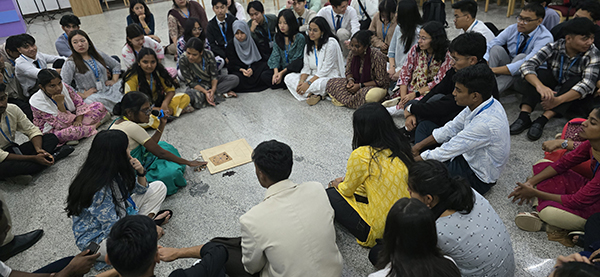
One-day Workshop on Brahmi Script
Date: 23 September 2025
The Department of History, Kristu Jayanti Deemed to be University, Bengaluru, organized a one-day workshop on Brahmi Script on 18 September 2025. The session was conducted to provide undergraduate History students with a practical understanding of ancient Indian scripts and their role in reconstructing the history of early India. The workshop was facilitated by Dr. Gautam Jantakal, an eminent Numismatist, Center for Numismatics Studies, Bengaluru. Dr. Jantakal introduced the participants to the historical background of the Brahmi script. The session combined lecture-based learning with hands-on practice. Students were trained to identify and reproduce selected Brahmi characters, enabling them to develop basic skills in reading inscriptions. The initiative not only enriched the students’ academic learning but also encouraged a deeper appreciation of India’s epigraphic heritage.
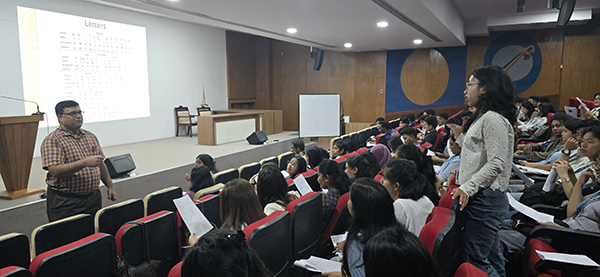
One-day Workshop on Emperor Ashoka speaks: The first words of historic India (Practical class on Brahmi script)
Date: 05 April 2023
The Department of History organized a one-day workshop on Emperor Ashoka speaks: The first words of historic India (Practical class on Brahmi script) by an expert - Mr. Gautham Jantakal, Senior Numismatics Consultant, Centre for Numismatics Studies Bengaluru. The main objective of the program was to identify and translate the script of ancient Indian languages. Miss Joana from HSPS 1st year, provided the prelude and welcomed the gathering.
Miss Manoja Yadivalli from HSPS 1st year, introduced the resource person. The workshop was organized in two sessions. In the first session resource person gave an introduction to the categories of scripts and a vivid explanation of how to differentiate the languages and scripts. The workshop then proceeded to identify the differences between the scripts of different origins and the usage of those in inscriptions. He enlightened students about the Brahmi script: the mother of all Indian and Southeast Asian scripts. In the second session, Mr. Gautam provided Hands-on training on the Brahmi script and taught students how to write as well as read it. Students were also provided worksheets to identify and read the script. He gave in-depth knowledge about Brahmi script which was translated into four different languages such as Brahmi, Roman, Devanagari, and Kannada, and students were asked to identify the Brahmi words, vowels, and conjunct consonants. At the end of the workshop, students were able to read given words and write their names in Brahmi Scripts of the Ashokan period. A few inscriptions from the Ashokan period written in Brahmi script were chosen and students were asked to read the inscription and learn how inscriptions are helping historians to know the history of a given period. Two student participants Devansh and Khushi, from HSPS 1st year, provided feedback on the session stating, the workshop was highly useful and informative for all the students. The session ended with a vote of thanks by Babita, HSPS 1st year.
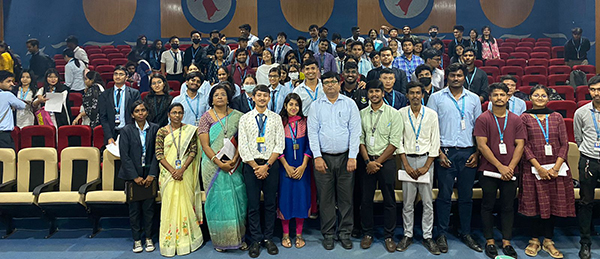
Workshop on Global Politics Young Voices
The Department of History in collaboration with the National Institute of Advance Studies - NIAS and St. Joseph’s University - SJU organized the second monthly workshop on Global Politics Young Voices for the current academic year on 28/02/2023 at Kristu Jayanti College, Bengaluru. Prof B. Ramya, Head of Department of History, Kristu Jayanti College provided the prelude and welcomed the gathering, and Dr. Suba Chandran, Dean, of the School of Conflict and Peace Studies provided an introduction to the GPYV program. The Global Politics Young Voices University Connects was aimed at improving the presentation and writing skills of young scholars, Current affairs awareness on global incidents, and training for competitive exams.
Three students of the History department, Ms. Manpreet Kaur (BA-HTJ VI SEM), M Harini (BA- HEP VI SEM), Ms. Blessy Babu (BA-HTJ VI SEM), and two students of Political science and Economics Mr. Kevin Jacob (BA PSEC IV SEM) and A Priyadharsini (BA PSEC IV SEM) from Kristu Jayanti College Autonomous Bengaluru were panelists and presented papers on recent global politics. Valuable comments and suggestions were provided by the Discussants from NIAS and St. Joseph University. Ms. Manoja Yadavili, Undergraduate Scholar, at Kristu Jayanti College also provided her remarks and feedback about the presentations. The session ended with the Vote of thanks given by Dr. Sakithyan, Assistant Professor, Department of History, Kristu Jayanti College, Bengaluru.
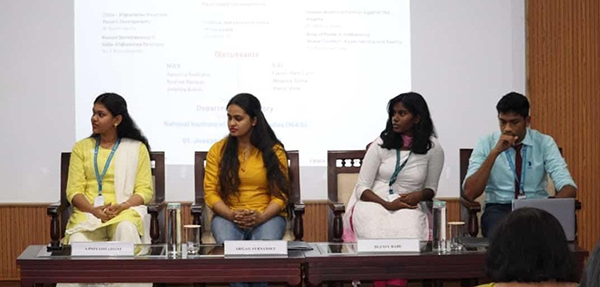
The Art of Facing Interviews: Etiquette and Mannerism
The Department of History organized a workshop titled “The Art of Facing Interviews: Etiquette and Mannerism” on the 13th of August 2020 through the online platform for the 3rd year History students in tandem with their VAC classes on the subject matter “History for Competitive Examinations.” The session was handled by Prof Ehboklang Pyngrope, Assistant Professor, Department of English, Kristu Jayanti College.
The workshop began by a welcome address and an introductory speech by Prof Hemango Akshay Hiwale. Then, the workshop proceeded with Prof Ehboklang Pyngrope educating students on the art of facing interview. Prof Ehboklang Pyngrope began by taking a mock interview of a student. He helped the student to understand what were the strengths and weaknesses in her interview and also what needs to be improved. Sir covered the entire sphere of art of facing interview by helping students to understand the mind-set of the interviewer. The resource person very impressively explained the Do’s and Don’ts while facing interviews. After which the workshop was opened to students for interactive session. The speaker helped all the students to clear their doubts and gain confidence while facing interviews. The session came to an end by delivering the vote of thanks by Pooja P Patil, student of BA (HEP) 5th semester.
There were 53 participants. Students gained confidence to face interviews after attending this workshop and are looking forward for more such utilitarian sessions.
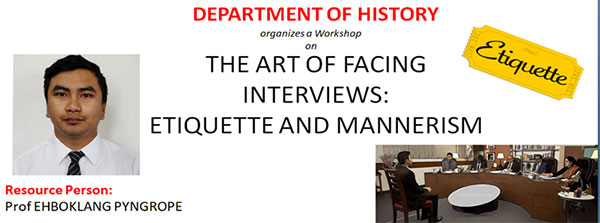
The Art of Writing: Writing Skills for Descriptive Competitive Examination
The Department of History organized a workshop “The Art of Writing: Writing skills for Descriptive Competitive Examinations” on the 13th of August 2020 for the 3rd year History students to substantiate the value-added course offered to them on the subject matter of “History for Competitive Examinations”. The session was handled by Prof Alna Mariya Isac, Assistant Professor, Department of English, Kristu Jayanti College.
The workshop began by a welcome address and an introductory speech delivered by Prof Hemango Akshay Hiwale. Post the welcome address the session was handed over to the resources person for the session, Prof Alna Mariya Isac to educate students on the art of writing. Prof Isac gave an elaborate presentation on the various areas to focus on while writing answers for competitive exams. She also explained it from the perspective of Civil Service Examination. To make students understand better she also gave examples by displaying her own hand written paper. The resource person very artistically covered the entire topic from grass root level. Post the presentation the session was opened to students to ask questions and interact. Prof Alna helped all the students to clear their doubts. The session came to an end with a vote of thanks offered by Nidhil C Prakash Nair, student of BA (HEP) 5th semester.
There were 55 participants. The students were extremely pleased to have got the opportunity to help improve their writing skills and clear various myths of UPSC Examinations. The students are looking forward for more such informative and fruitful sessions.
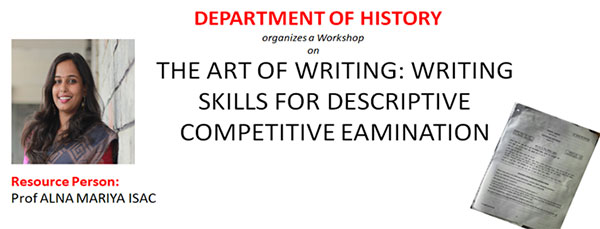
"Debating the Past for the Future" - A workshop on the Art of Debating
“The Department of History organized a Workshop titled “Debating the Past for the Future” on the Art of Debating on 07/12/19. Mr Aaron Mirza, an advocate by profession and a national level debating champion was invited to train the students to enhance their debating skills and to introduce them to the importance of public speaking with a strong hold of history which will allow the speaker to have a strengthen base of his or her argument in augmenting a positive future. The speaker also strongly advised the students to involve themselves in various activities like intercollegiate debates and MUN, this, he emphasized, will expose the students to the different ideologies, opinions and understanding of individuals which will eventually allow them to be informed speakers.
During the session, the students were divided into groups and were given a platform to reinvent historical ideas and re-establish the relevance of these ideas. They were provided with worksheets to work on their usage of language in advancing their ideas in a debate or a public speaking forum. The groups were then exposed to glimpse of MUN, where the groups were given countries and various agendas like the plight of refugees, terrorism, rape, drug abuse and climate change keeping in mind the debate to be done on a historical basis.”
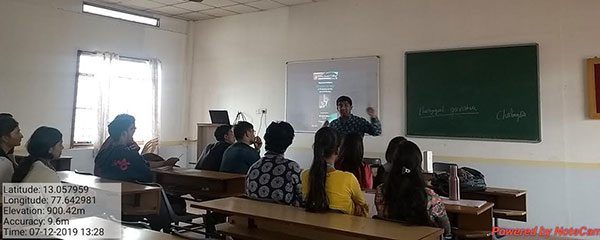
"Situating the Relevance of Manuscripts in History Writing"
“The Department of History in association with the National Institute of Prakrit Studies, Sravanabelagola organized a workshop titled “Situating the Relevance of Manuscripts in History Writing” on 06/12/19 for the IV and VI BA HEP students. The workshop started with an introduction to Manuscript writing and the formation of these manuscripts before the writings were inscribed. The students received first hand information and a demonstrative explanation as to how these manuscripts are made ready for inscribing the information. They were also explained of the various tools used in inscribing. The students were then informed about the importance of preserving manuscripts and their relevance in decoding ancient cultures and heritage. The students were also encouraged to find a passion in manuscripts as their profession for it is extremely valuable and a noble work. The students got an opportunity to interact with faculties and researchers of the institute.”
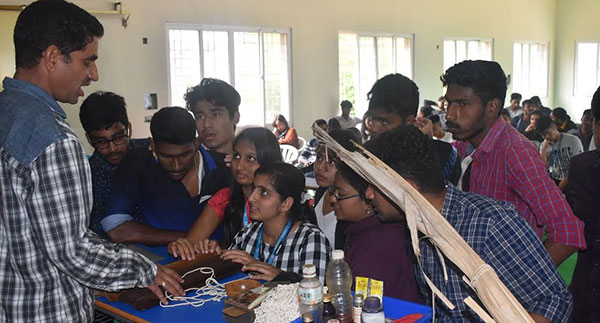
Early Indian Scripts- Ashokan Brahmi
Date: 28th September, 2018
Number of beneficiaries: In-house: 66 External: 0
List of Resource Persons with details:
1. Mr. Gautham Jantakal, Numismatics Consultant, Centre for Numismatic Studies, Bangalore
Objective: To make students aware of the significance of ancient Indian scripts such as Ashokan Brahmi and help them to comprehend its significance in reconstructing historical narratives.
Session I: Theorizing on the concepts of Language and Scripts.
The resource person started the workshop with a theorizing session on the basics of Language and Scripts. The students were made aware of the fundamental features and characteristics of languages and scripts and thus they were able to differentiate between the two. Mr. Jantakal also pointed out the examples of ancient Indian languages such as Pralrit, Pali and Sanskrit and Indian scripts such as Indus, Brahmi, Kharosthi and Greek.
The evolution of writing systems from pictures, pictograms, ideograms and phonograms were also explained. Mr. Jantakal thereafter proceeded to discuss the evolution of the Ashokan Brahmi Script.
Session II: Technical Session
Students in this session were taught to identify the basic and elementary Ashokan Brahmi alphabets. They were also made to identify and transliterate simple words written in the Brahmi script.
Outcome:
1) Students were taught the significance of the Ashokan Brahmi Script for reconstructing ancient Indian history
2) Awareness and understanding the difference between scripts and languages.
3) Awareness about various concepts such as Phonograms, Pictograms, Ideograms etc
4) Reading and Writing basic words in the Ashokan Brahmi script.
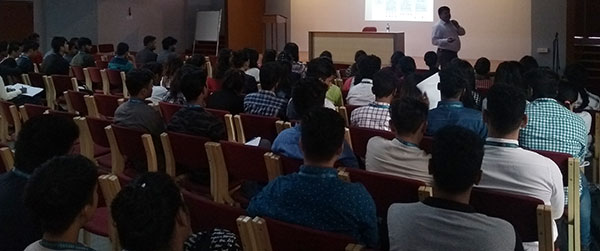
Workshop on “Preservation of Palm leaf Manuscripts
Date: January 18th 2017
Time: 1.45 -3.00 P.M
Classes Attended: I, III, V Sem B.A HEP/ HTJ students
Number of beneficiaries: 112
Resource Persons:
1. Mr. Hazari Parsvanath, Assistant Director of Manuscript Dept., National institute of Prakrit Studies & Research, Shravanabelagola
2. Dr. Sreedhar, Head, Department of Hindi, Kristu Jayanti College, Bengaluru
Objective: To provide hands on experience in the use and handling of manuscripts.
As part of youth week celebrations 2017, NSS unit of the college in collaboration with the Dept. of History organized a workshop on “Preservation of Palm leaf Manuscripts”. It is one of the oldest medium of writing in India especially in Southern India. Indian Manuscripts are the richest collection of written documents, texts and scripts. These written documents provide information on the existence of different civilisations and emphasise the importance of their survival. The manuscripts are vital Sources of History of India. A manuscript is a handwritten composition on paper, bark, cloth, metal, palm leaf or any other material. They reflect the magnificence of the Indian civilisation including languages, philosophy, art and architecture. The Workshop focused on providing information about preparation, use and preservation Palm leaf manuscripts. Steps regarding preparation of Palm leaves, boiling the leaves, drying and polishing for writing or painting were explained. Preservation techniques adopted by the Project specialists to preserve original manuscripts were demonstrated. Normally treatments are given using fumigation chambers to protect palm-leaves from white ants, fungus and other insects by using Thymol and chloromate solution. Students were provided hands in training on the preservation techniques
Feedback:
• Very productive session – respect the heritage of manuscript culture in India
• Interesting to see and hold manuscripts
• Interesting and Informative
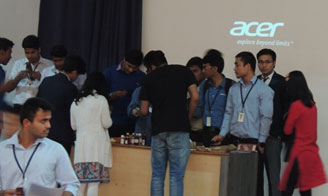
Role of Numismatics in History
Date: July 8th 2016 | Time: 9.00 -1.00 P.M
Classes Attended: I, III, V Sem B.A HEP/ HTJ students
Number of beneficiaries: 117
Resource Person: Mr. Gautam Jantakal Numismatics Consultant, Bengaluru
Objective: To instill an understanding on the role of coins in the study of History
Mr. Gautam Jantakal, made an enlightening presentation on the background and history of Numismatics. Numismatics is the study or collection of currency, including coins, tokens, paper money, and related objects The session was highly informative. The session provided an outline of early Janapada coins, Punch marked coins, and developments in coinage during medieval and modern India. Rare coins collected by the resource person were circulated and it showcased the rich and diverse cultural heritage of Indian coins.
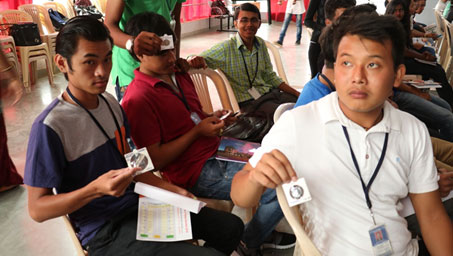
Workshop on Introduction to Indian Archaeology
Theme: Ancient Indian Literature and Epigraphy
Date: 2/12/15 | Venue: Mini Audi I
Number of Participants: 30 BA HEP/HTJ students
Aim: To help participants understand the vast plethora of data available in India’s Past, and guide them through scientific methodology to collect and interpret data in a manner that enhances their experience of Indian Past.
Session time: 6 hrs
In this workshop, we will explore the role of oral History, and learn how to derive information from written sources of Ancient India.
Eligibility: participants must be generally familiar with stories of Ramayana & Mahabharata, life of Buddha & Ashoka.
Session 1: 3 hrs
Ashokan Brahmi - Learn how to read and write Ashokan Brahmi
Session 2: 1.5 hrs - Humanism and Ancient Indian Literature
- PPT slide show and Lecture
Session 3: 1.5 hrs - Jataka Tales
- Learn how to derive history
Resource Person:
Ms. Lathashree K.S.
M.A. in Ancient Indian History, Culture and Archaeology
Alumnus: Deccan College Post-Graduate and Research Institute, Pune.
Trainer in Archeology, Art and culture
Contact Details: M: +91-94484-87781 E-mail: latha26shree@gmail.com
Project: https://www.facebook.com/groups/trystwithhistory/
Session- I (9:30 – 1pm )
Introduction to Brahmi script
The Brahmi script is one of the most important writing systems in the world by virtue of its time depth and influence. It represents the earliest post-Indus corpus of texts, and some of the earliest historical inscriptions found in India. Most importantly, it is the ancestor to hundreds of scripts found in South, Southeast, and East Asia.
Brahmi is a "syllabic alphabet", meaning that each sign can be either a simple consonant or a syllable with the consonant and the inherent vowel /a/. Other syllabic alphabets outside of South Asia include Old Persian and Meroïtic. However, unlike these two systems, Brahmi (and all subsequent Brahmi-derived scripts) indicates the same consonant with a different vowel by drawing extra strokes, called matras, attached to the character. Ligatures are used to indicate consonant clusters.
In this session the students were taught to read & write Brahmi script. It began with the study of consonant and later vowels. The experience of writing their own names and family titles encouraged participants to willingly study brahmi script. The participants were very enthusiastic and had an interactive session.
And an example of strokes added to indicate different vowels following the consonants /k/ and /l/.
The exercise of deciphering the rock edict of Asoka was very fascinating and unbelievable experience.
Session-II & III (1:45pm-4:45pm)
Learning History from Jataka Tales
The Jātaka refer to a voluminous body of literature native to India concerning the previous births of the Buddha. These are the stories that tell about the previous lives of the Buddha, in both human and animal form. The future Buddha may appear in them as a king, an outcast, a god, an elephant—but, in whatever form, he exhibits some virtue that the tale thereby inculcates.
This idea of importance of thought is one of the foundations of Buddhism. With this, the idea of passing on knowledge and increasing one’s wisdom is of utmost importance. In order to make sure this move toward enlightenment is attained, a part of the Buddhist tradition is the telling of stories that stress moral themes. One major group of these stories is known as the Jataka Tales. Originating in India, these stories are about the reincarnation of Buddha, a spiritual teacher and founder of Buddhism. Jataka tales were originally recorded in literary form, but interpretations have been performed in dance, theatre, and formal recitation. The reincarnation of Buddha, often into animal form, is one of the main themes of many of the stories. All of the stories contain a moral lesson that teaches the wisdom of Buddhism.
This session was the most interactive session on how to decipher history from Jataka tales in the beginning , it began with listening to stories and discussion on what is to be given importance while deciphering history from these stories like the materials, social systems, law, position of people, guru-shisyaparampara etc. and the participants also witnessed charts and stories of crow that drank water from pot which indicate the period/time.
Session III included a role play on the various historical narrations given in the Jataka tales .The stories enacted helped to understand the topic more effectively.
Participants feedback summary
• This workshop was interesting, & really helpful .It directed us to a new path of interest, hope, importance towards the subject
• The session was interesting and informative, went without any room of monotony
• It was a productive session as we experienced a new topic in history and we hope the Dept. of history and College to conduct many more workshops in the days to come as it would result in development of knowledge and better understanding of subject to gain wisdom
• The exercise of deciphering the rock edict of Asoka was very fascinating and unbelievable experience.
• Grateful to Principal and Financial administrator for funding for the workshop.
